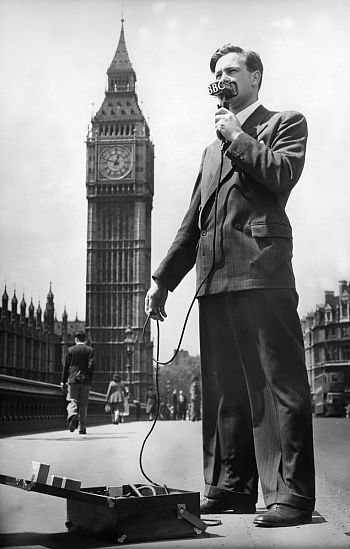How the BBC fought Britain’s war of words during the Cold War
The BBC World Service was on the frontline of Britain’s war of words with the Soviet Union during the Cold War, a new book by a University of Sussex historian reveals.
 Yugoslav Section June 1950: ‘The projection of Britain abroad was an important part of BBC programmes overseas during the Cold War. In June 1950, a BBC Yugoslav Section reporter introduces listeners to the sounds of London, and the chimes of Big Ben'. Photo copyright BBC.
Yugoslav Section June 1950: ‘The projection of Britain abroad was an important part of BBC programmes overseas during the Cold War. In June 1950, a BBC Yugoslav Section reporter introduces listeners to the sounds of London, and the chimes of Big Ben'. Photo copyright BBC.
 Dr Alban Webb was given privileged access to BBC files in order to tell the story of how the BBC World Service found itself on the frontline of the UK's Cold War efforts
Dr Alban Webb was given privileged access to BBC files in order to tell the story of how the BBC World Service found itself on the frontline of the UK's Cold War efforts
With exclusive access to previously unseen BBC files, Dr Alban Webb’s book is the first to tell the full story of the World Service’s role in broadcasting behind the Iron Curtain in the second half of the 20th century.
London Calling: Britain, the BBC World Service and the Cold War was launched this week (Tuesday 28 October) with a special debate at BBC Broadcasting House in London.
For nearly eight decades, from the Second World War, the World Service was funded by the UK Government. This ended on 1 April 2014 when, as result of a deal struck between the government and the BBC in 2010, licence-fee funding of the World Service began.
Dr Webb, Research Fellow in Broadcasting History in the University’s Department of Media and Film, says:
“The BBC World Service was the principal means of engaging listeners behind the Iron Curtain, who were otherwise unreachable, and challenging the authoritarian leaderships of Central and Eastern Europe during the Cold War.
“The Soviet Union and its satellite states went to great lengths to stop these broadcasts getting through, including major jamming operations to obliterate the BBC’s programmes and a prohibition on listening to broadcasts from the West.”
The book reveals an intimate, yet difficult, relationship between the BBC and government officials. At the height of the Cold War’s ‘war of the ether’, as it is sometimes called, there was daily contact between the Foreign Office and senior staff at the World Service.
Dr Webb was surprised to discover the extent to which British foreign policy during the Cold War relied on the World Service to broadcast in the ‘national interest’, projecting British values and principles.
He says: “The government, primarily through the Foreign Office, took a very close interest in the World Service, not just because it funded it, but also because it was considered such an important tool in getting the British point of view heard throughout the world.
“Today, this is often called ‘soft power’, and the influence the BBC World Service was able to wield as a trusted international broadcaster was immensely important to the British government.”
Such was the strategic value placed on the World Service that one British Prime Minister – Anthony Eden during the Suez crisis of 1956 – even tried to wrestle control of the service from the BBC. Eden demanded that the BBC should broadcast in support of the UK’s attempt to re-take the strategically important Suez Canal in Egypt. The BBC, reflecting the stark division in British public opinion, refused.
Dr Webb explains: “At this point, the Prime Minister, Anthony Eden, instructed ministers and officials to take control of the BBC World Service. However, by the time this could be enacted, the Suez crisis had proved a disastrous failure for the British government, and within a couple of months Eden had resigned. The threat to the World Service had been averted.
“It ranks as the most serious argument between the BBC and the government of all time.”
The BBC commissioned Dr Webb as a PhD student to write its history during the Cold War. As the BBC’s Austen Kark Memorial Scholar, Dr Webb spent five years researching the BBC's written archives and government archives and interviewing BBC veterans of the Cold War period.

